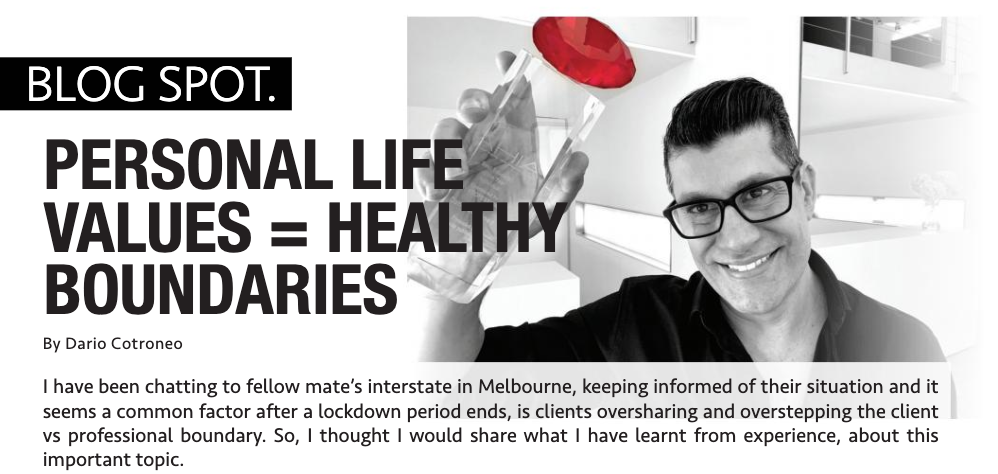By admin
Posted in Uncategorised
I have been chatting to fellow mate’s interstate in Melbourne, keeping informed of their situation and it seems a common factor after a lockdown period ends, is clients oversharing and overstepping the client vs professional boundary. So, I thought I would share what I have learnt from experience, about this important topic.
Hairdressing requires a level of trust and intimacy that is unique to other industries. In a single day, hairdressers touch, speak, console, cheer-up, and listen to several clients. That’s no small feat in the professional world.
The client-hairdresser relationship is a unique one and may be difficult to navigate at times. The following is to bring a fresh awakening to your role and learn how to avoid overstepping both personal and professional boundaries.
Setting healthy boundaries helps you prioritise your needs over other people’s wants.
We all have boundaries. These are the rules that govern how we interact in our relationships with others, indicating what we find to be acceptable and unacceptable behaviours. Everyone’s boundaries are different. Knowing what your boundaries are, comes from a personal sense of self-worth, and your personal values in life.
Setting healthy boundaries, is not always easy. It is a skill that can take time to get right. I think now is the best time to reset yours, given what everyone is experiencing with Covid.
Professional boundaries are rules and limits that prevent the lines between yourself and the client from becoming blurred. Professional boundaries are a framework to maintain a safe working environment for both parties.
Some examples of professional boundaries may include:
- Not discussing a client’s personal information with others.
- Not performing additional favours for clients, outside of the scope of your role.
Personal boundaries may be less explicit than professional boundaries. They may include physical, emotional, and mental limitations, which hairdressers can adopt to protect themselves from being drawn in or becoming overly invested in their client’s lives. Personal boundaries allow hairdressers to maintain psychological safety for themselves and their clients.
Some examples of personal boundaries may include:
- Not discussing your personal problems with your client (such as relationships).
- Not worrying about your client once they have left the salon and you have gone home.
Realistically, boundaries will occasionally be crossed or blurred at various points in a hairdresser’s relationship. This could be due to a particularly difficult situation, stress, bad luck, or manipulation by a client.
In these cases, it is your responsibility to avoid boundary crossings from becoming a pattern and damaging the professional relationship.
Examples of boundary crossings include:
- Inappropriately disclosing personal information.
- Confidentiality about you and other clients.
- Inappropriate verbal abused (bullied) and aggression.
The key to managing many of these boundaries is understanding the difference between a professional and a personal relationship and ensuring that your behaviour always remains on the right side of the line.
If you are unsure if what you are doing is crossing a boundary, ask yourself these five questions:
- What is my role in this situation? E.G. Are you acting as a professional hairdresser or a friend?
- Am I sharing personal information for my benefit or for the benefit of the person I’m helping? Sharing information about yourself can significantly help the engagement process (building trust), however it depends on the information and the context of the sharing.
- Are my emotions clouding the issue with the person I am looking after?
Sometimes we develop a strong liking or dislike for a person we are helping (transference/counter transference). If your emotions are clouding your judgment, step back and if possible, consider having another person step in.
- Are the other person’s emotions clouding the issue with me? If you are getting strong (positive or negative) emotions in the person you are looking after, you might want to consider passing them to someone else, particularly if the person you are helping is aggressive toward you.
- If in doubt, don’t! If you’re not sure whether to share a story about yourself, don’t.
From my 32 years in this beautiful industry, I have learnt to find my own boundaries that benefit myself, colleagues, and my clients. Saying No to what doesn’t align with my values and saying YES to what does, assists me to remain mentally well, honest and maintain healthy, lasting relationships.
I hope you can find your boundaries! Remember you can be a good person with a kind heart and still say NO.
Stay safe!
Dario x
Founder and Educator DCI Education www.dcieducation.com


